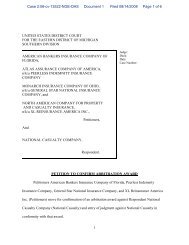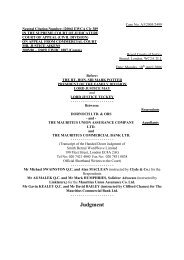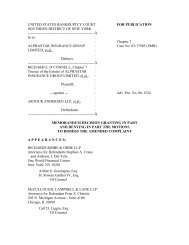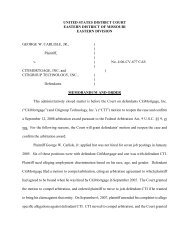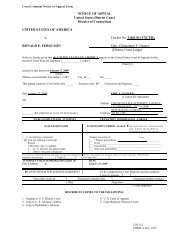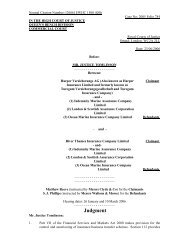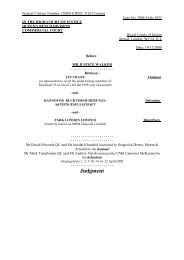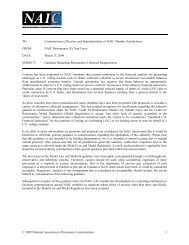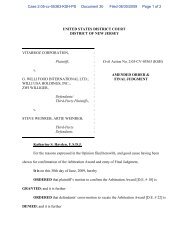Statutory Issue Paper No62R - Reinsurance Focus
Statutory Issue Paper No62R - Reinsurance Focus
Statutory Issue Paper No62R - Reinsurance Focus
Create successful ePaper yourself
Turn your PDF publications into a flip-book with our unique Google optimized e-Paper software.
SSAP No. 62R<br />
Statement of <strong>Statutory</strong> Accounting Principles<br />
Because both condition (a) and condition (b) must be met, failure to transfer significant<br />
timing and underwriting risk is not overcome by the possibility of significant loss to the<br />
reinsurer.<br />
19. Q: Is it permissible to evaluate timely reimbursement on a present value basis?<br />
A: No. The word timely is used in the ordinary temporal sense to refer to the length of time<br />
between payment of the underlying reinsured claims and reimbursement by the<br />
reinsurer.<br />
While the test for reasonable possibility of significant loss to the reinsurer provides for a<br />
present value-based assessment of the economic characteristics of the reinsurance<br />
contract, the concept of timely reimbursement relates to the transfer of insurance risk<br />
(condition a above), not the reasonable possibility of significant loss (condition b above).<br />
Accordingly, timely reimbursement should be evaluated based solely on the length of<br />
time between payment of the underlying reinsured losses and reimbursement by the<br />
reinsurer.<br />
20. Q: Are there any circumstances under which the conditions for risk transfer need not be met?<br />
A: Yes. An extremely narrow and limited exemption is provided for contracts that reinsure<br />
either an individual risk or an underlying book of business that is inherently profitable.<br />
When substantially all of the insurance risk relating to the reinsured portions of the<br />
underlying insurance contracts has been assumed by the reinsurer, the contract meets the<br />
conditions for reinsurance accounting. To qualify under this exception, no more than<br />
trivial insurance risk on the reinsured portions of the underlying insurance contracts may<br />
be retained by the ceding entity. The reinsurer’s economic position must be virtually<br />
equivalent to having written the relevant portions of the reinsured contracts directly.<br />
21. Q: In determining whether a reinsurance contract qualifies under the exception referred to in<br />
the preceding question, how should the economic position of the reinsurer be assessed in<br />
relation to that of the ceding entity?<br />
A: The assessment should be made by comparing the net cash flows of the reinsurer under<br />
the reinsurance contract with the net cash flows of ceding entity on the reinsured<br />
portions of the underlying insurance contracts. This may be relatively easy for<br />
reinsurance of individual risks or for unlimited-risk quota-share reinsurance, because the<br />
premiums and losses on these types of reinsurance generally are the same as the<br />
premiums and losses on the reinsured portions of the underlying insurance policies.<br />
In other types of reinsurance, determining the reinsurer’s net cash flows relative to the<br />
insurer is likely to be substantially more difficult. For example, it generally would be<br />
difficult to demonstrate that the ceding entity’s premiums and losses for a particular layer<br />
of insurance are the same as the reinsurer’s premiums and losses related to that layer. If<br />
the economic position of the reinsurer relative to the insurer cannot be determined, the<br />
contract would not qualify under the exception.<br />
Accounting Provisions<br />
22. Q: An existing contract that was accounted for as reinsurance no longer qualifies for<br />
reinsurance accounting under the new accounting rules included in SSAP No. 62. How<br />
should the ceding and assuming companies account for the contract in future periods?<br />
© 2009 National Association of Insurance Commissioners 62-28


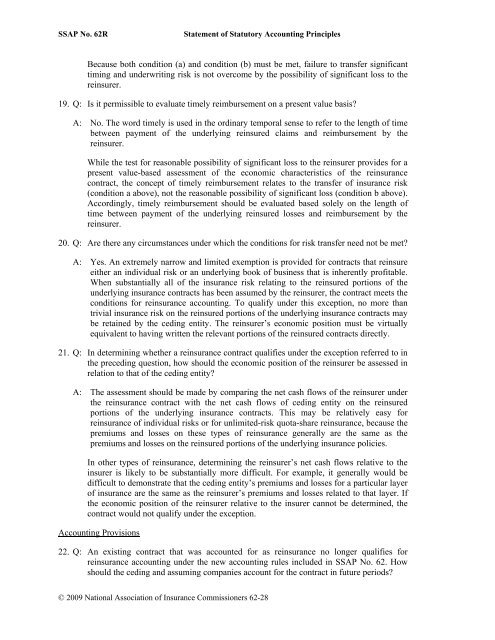
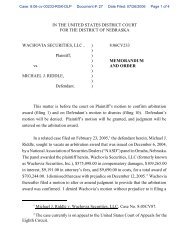
![202 Folio No 734 Neutral Citation Number: [2006] EWHC 1345 (QB ...](https://img.yumpu.com/50015000/1/184x260/202-folio-no-734-neutral-citation-number-2006-ewhc-1345-qb-.jpg?quality=85)
